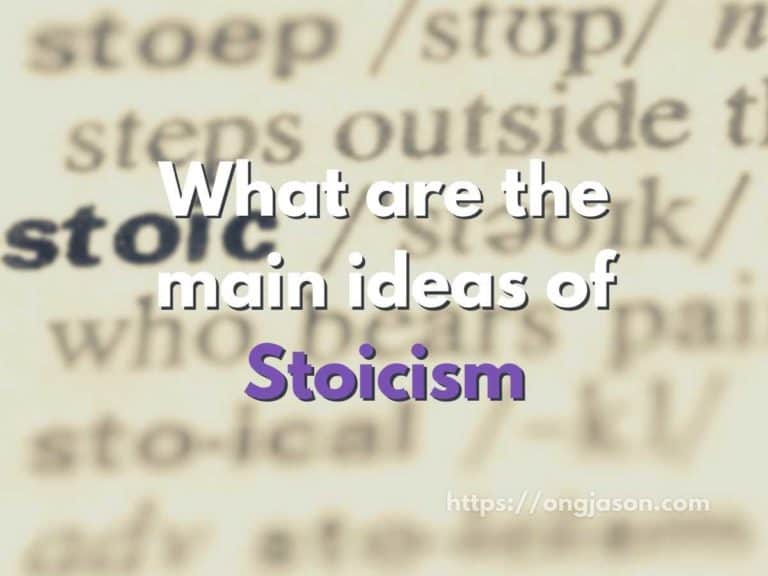Being a Stoic: Is it Good or Bad? | The Benefits and Drawbacks of Stoicism
There have been many thoughts on Stoicism, especially if it is good or bad for us. For someone trying to follow the philosophy, it can be frustrating to follow something without fully knowing its advantages and disadvantages. Thus, I decided to give both the good and the bad of being Stoic.
It is ok to be a Stoic because there are many benefits to being one, such as focusing on the things that matter, decreasing stress, and building resilience. However, Stoicism can also not be good for us if we take Stoicism to the extreme because it can affect our emotional connection to others.
In this blog post, I will not only give you the benefits or the advantages of Stoicism, but I am also going to give you the drawbacks or the disadvantages of the said philosophy. This way, you will have a clear expectation when following the philosophy. Furthermore, I will give a simple tip to prevent Stoicism’s drawbacks.

Is It Good or Bad To Be Stoic?
Stoicism is good for us if we have the right balance in following its ideals. Finding balance is essential to get the benefits of Stoicism. This means following Stoicism too much can cause some issues, like having trouble connecting with other people on the emotional level, leading to isolation tendencies.
Furthermore, not knowing fully what Stoicism is all about can be bad for our wellbeing.
This is not a scare. This is simply a fact I am presenting that not knowing Stoicism can cause some issues.
This is especially true since people see Stoics as emotionless people.
For starters, Stoicism is not being emotionless.
In fact, being emotionless disregards one of the essential aspects of Stoicism which is not caring for things we can’t control.
The Stoics believe that one of the things we can’t control is feeling emotions.
This means everyone can feel happy, sad, excited, and many more.
Thus, Stoicism is not about being emotionless. Instead, it is about controlling these emotions.
To be specific, they prevent emotions from turning into passion.
What passion means is the over-exaggeration of emotions that can block our rational or logical thinking.
For example, someone who is extremely angry can lash out at their peers for no apparent reason.
Lashing out to others due to anger is an example of passion in which too much anger can cause a person to lose their logical thinking, which, in this case, is very illogical to do.
That’s why Stoics try to control or react appropriately to emotions.
The Stoics see emotions as something that happens regularly. Thus, they accept this emotion and react to them accordingly.
This makes Stoicism suitable for resiliency. Since our emotions don’t control us, we can live our lives focusing on important things while making us resilient.
One of the good things Stoicism can do for us is that it gives us a sense of empowerment.
Since we start working only on the things we can control, it can help us feel that we are not helpless.
Regardless of the things we can’t control, we can, and focusing on them is Stoicism.
As you can see, Stoicism can both be good or bad. What matters is how we view Stoicism and how much we follow Stoicism.
As I said, proper balance is key.
Thus, if you want to get the benefits of Stoicism, you should take note that there is a healthy dose of Stoicism.
But what are the benefits and drawbacks of Stoicism? Let’s find out.

Are There Benefits to Being Stoic?
Being a Stoic offers many benefits, such as helping us focus on the things that matter, helping us find meaning, making us more resilient, making us feel less stressed, helping us live a fulfilling life, and many more. Ultimately, Stoicism makes us feel grateful for all the things we have.
Here are the benefits of being a Stoic.
1. Stoicism Helps Us Focus on the Important Things
Stoicism helps us focus on the crucial things because one of its main teachings is to not care about the things we have no control on. This means we can start focusing on what we can change, which ultimately makes us feel empowered.
As I said earlier, one of the things Stoicism teaches is that we should focus on the things we can control.
For example, we can’t control what others say to us. No matter how we try, we can’t control other people.
Trying to control other people would only lead to stress, which is especially true in our age where we can talk to everyone around the globe.
That’s why Stoicism is good, especially if we try to only care about things we can’t control.
For example, I don’t know what the algorithm will do to my videos on my YouTube channel. But what I can control is the videos I publish.
I make self-improvement videos on YouTube, and I gladly invite you to check my Channel to learn more about personal development. You can find my Channel by clicking here.
I can try to make these videos appealing to people and improve my camera speaking skills.
This makes me work in line with my goals. So instead of contemplating on things I couldn’t control, I started to find something I could do to reach my goals.
Ultimately, this made me feel empowered and not helpless.
2. Stoicism Helps Us Find Meaning
Stoicism helps us find meaning in the sense that it makes us reflect on our past, present, and future. With reflection, we can align our past learnings to our everyday lives, leading to building the future we want. Likewise, by knowing what we want, we can find meaning in the things we do.
One of the things Stoicism teaches is the impermanence of things.
This means your favorite things, your loved ones, and we are not permanent.
Accepting that fact helps us live our lives to the fullest.
Instead of wasting our time doing things that don’t give us joy, we can start doing things that matter.
This is living life with meaning.
In fact, Stoics are fond of journaling, which helps us identify our goals and dreams.
By knowing your real goals, you can start having meaning in your everyday life.
You can always ask if you are working according to your goals or have done something that made you closer to your dreams.
By trying to live every day like this, we can start finding some reasons why we wake up in the morning.
Guide: If you want a journaling guide, you may check my other blog post where I shared how I personally do journaling. Here is the link: A Complete guide on How to Reflect on Your Day
3. Stoicism Helps in Making Us Happier
Stoicism helps in making us happier by letting us understand that there are things outside our control. By understanding this, we can start not caring about things we can’t control. By focusing our attention on the things we can control, we can feel empowered in our life making us happier.
Stoicism is a good philosophy to follow in times of stress.
It makes us live a happy life.
This is because Stoics know the things they can’t control.
Thus, they tend not to care about those things.
For example, rather than living according to what others think, Stoics live according to their dreams.
That’s why it is common to see Stoics not caring what others think since we can’t control other people’s thoughts.
Since we start only thinking about what we can control, we can achieve some results in our actions, leading to a sense of fulfillment and happiness.
4. Stoicism Helps Us Understand and Control Our Emotions
Stoicism helps us understand and control our emotions by teaching us to handle them from a logical perspective. Rather than letting our emotions control us, we can control our emotions instead. This makes us feel in control of our lives.
Rather than letting emotions control them, the Stoics learned how to manage their emotions.
They do this by handling emotions from a logical perspective. They don’t let emotions prevent them from thinking logically.
Not lashing out at our friends when we’re angry is a perfect example of this.
By understanding that we can control our emotions, we can start proving that we own our lives.
5. Stoicism Makes Us Live a Fulfilling Life
Stoicism makes us live a fulfilling life by giving meaning to our actions. This is because one of the goals of Stoicism is to find our real goals and dreams by reflecting on our past, present, and future. Thus, living our daily lives with meaning helps us have a fulfilling life.
Earlier, I said that Stoicism gives meaning to our lives by helping us know our actual goals.
Ultimately, this leads to having a fulfilled life where we know that we are constantly working towards our goals.
This sense of gratitude makes us satisfied even if we haven’t reached our goals.
It doesn’t matter if we are still away from our goals. The important thing is we are slowly getting there through our actions.
6. Stoicism Makes Us Less Stressed
Stoicism makes us less stressed by allowing us to focus only on things we have control on. This makes us feel empowered and in control of our lives which leads to less stress. Furthermore, Stoicism helps us not care about the small things that can cause unnecessary stress.
The beauty of Stoicism is that it teaches us about the things we can’t control.
Usually, these things cause stress even if we can’t do something about it.
The perfect example is thinking about what others think. We can’t control people, but many of us are stressed out because of someone’s comment about us.
What’s worse is there are times where we don’t even know the person giving these comments.
Stoicism helps us not care for these small things that shouldn’t affect us.
Since we have fewer things to care about, this lessens stress.
7. Stoicism Builds Resilience
Stoicism builds resilience because it teaches us about the things we can and can’t control. By focusing on the things we can control, we can become stronger and more resilient. Furthermore, not caring for things we can’t control helps us cope when times are hard.
Since Stoicism is about not caring for the things outside our control, it lessens our stress. Since we aren’t that stressed, we can be more resilient.
For example, bad things that happen to us are usually out of our control.
Since we understand that we shouldn’t care about things we can’t control, we can be more resilient in hard times.
That’s also why Stoics are said to be generally happier.
I also believe that Stoicism is a good philosophy, especially in challenging times since it has helped many people cope during these times.
8. Stoicism Practices Discipline
Stoicism helps us practice discipline because we start to feel responsible for the things we can control. Rather than letting others be responsible for us, we can start being responsible for ourselves since we can’t control what others do.
The beauty of discipline is making us responsible for ourselves.
That means not letting other people decide for us.
If you think about it, we can’t control what others do. The only thing we can control is our actions.
Since we can’t control others, we need to start being responsible for our wellbeing. Relying on other people can only cause disappointment.
That’s why Stoicism builds discipline.
To make us happy, you start to improve your life. For example, you can start eating healthy, sleeping early, working, and many more.
9. Stoicism Makes Us Grateful
Stoicism makes us feel grateful for the things we have. This is because Stoicism teaches us to reflect on our actions. One of the things reflection does is to see the things we take for granted. Because of that, we become more grateful when practicing Stoicism.
I talked about reflection earlier and how Stoicism helps us live a meaningful life.
This is because Stoicism tries to make us aware of our goals.
However, one thing Stoicism also focuses on is the importance of the present moment.
We have a lot of things to be grateful for in life. However, we often neglect them.
For example, having three meals a day is a gift for people living in poverty, or having a roof above your head is something we often take for granted.
Always remember that there are people around the world that would wish for the things you have.
Because of reflection, Stoicism can help us see these things we take for granted.
Find out More! If you want to find out more about reflection, feel free to check my other blog post here: What Is Self-Reflection and Why Is It Important?
10. Stoicism Makes You Virtuous
Stoicism makes us virtuous because one of the things the philosophy focuses on is guiding our actions through virtues. To Stoics, there are four essential virtues which are wisdom, justice, courage, and temperance.
I can’t forget the essential thing that drives Stoics to do action: the Stoic virtues.
The Stoics believe in acting according to these virtues, which are wisdom, justice, courage, and temperance.
However, you can also find some texts about these virtues as prudence, morality, fortitude, and moderation.
They aren’t different from each other. The difference is only caused by translating ancient texts to English.
But my point is Stoics are urged to act according to these virtues to live a good life.
Thus, practicing Stoicism can make you virtuous.

Are There Drawbacks to Being Stoic?
There are drawbacks to being Stoic such as making it hard to emotionally connect with others, making us give up fast, or making us not try. Therefore, it is crucial to have a proper balance and understand Stoic philosophy since not understanding Stoicism can lead to these disadvantages.
Here are the disadvantages or drawbacks of Stoicism.
1. Stoicism Might Make It Hard to Emotionally Connect with Others
Stoicism might make it hard to emotionally connect with others because Stoics are always trying not to let their emotions remove their logical thinking. The problem is that all of us connect through emotions, making it harder for Stoics and might lead to isolation.
The problem is that people tend to improve their relationship when they’ve emotionally connected with a person.
What happens is that Stoics can have a hard time connecting to these emotions since they don’t want feelings to harm their logical thinking.
This makes it hard for Stoics to connect with others and is also why some Stoics tend to isolate themselves since they don’t see any reasons to communicate with other people.
2. Stoicism Might Make You Give Up Fast
Stoicism can make a person give up fast because Stoicism focuses on not caring about the things they can’t control. Sometimes, some things seem out of control, but the only thing we need to do is continue. That means a Stoic has a tendency to give up if they didn’t do some good assessment.
Another problem with people who take Stoicism too much is that they tend to give up fast.
For example, if you’re starting a business, the first years of the business will always be hard. Sometimes, it will always be stressful, and it would feel as if you’re in a race.
The problem here is that some might see that since Stoics don’t care for things they can’t control, they start to see this as a sign to give up.
3. Stoicism Might Not Make You Even Try
Stoicism might not make a person try since they might think that trying is useless. The problem is that there are times where our assessment of our abilities is wrong. There are times we underestimate our abilities which prevents us from seeing our true potential.
Another problem is that Stoicism might make you not work on your goals, especially if you underestimate your abilities.
For example, you might have a dream but don’t want to work for it because you think you can’t start.
Try things out a little since we all make mistakes.
Furthermore, there is joy in trying to prove yourself.
4. Some People Take Stoicism the Wrong Way
Another problem is when a person takes Stoicism the wrong way.
Stoicism is not about being emotionless. It is about controlling these emotions.
The problem here is that some people don’t understand Stoicism since they tend to see it as not having emotions to be logical.
But as we’ve discussed earlier, that is far from reality.
What happens is that the person won’t be able to remove their emotion, making them believe that Stoicism is useless.
Furthermore, they can even try to question themselves for failing.
That’s also why I started this blog post talking about why Stoicism is not about removing emotions.
Stoicism is a valuable tool in making us resilient, happy, and calm. However, like a tool, it will only work if we use it appropriately.
Conclusion
As you can see, everything that is too much is bad. This includes Stoicism.
That’s why a healthy dose of Stoicism is ideal if we want to attain its benefits.
In fact, it is ideal for us to switch from time to time.
I mean, we should follow Stoicism in times of stress and where we feel helpless. This helps us be more resilient.
But there are times where we have to force ourselves to try new things. There are also times where we need to connect with others emotionally.
Thus, there are instances in our lives where we need to follow Stoicism to lead a fulfilling life, but there are also times when we need to have the right balance to have fulfilling relationships.
Stoicism is neither good nor bad. What matters is how we use it and how much we use it. While Stoicism is generally good for our wellbeing, misusing it can be detrimental for us. Lastly, using it too much can also be bad for us because it can prevent us from connecting with our loved ones.
What’s next? Now that you understand that balance is key to Stoicism, you need a guide on how Stoics handle emotions. So I made another blog post talking about the simple three-step process on how Stoics control emotions in this blog post: How do Stoics Handle Emotions?

“Only the things I love.“
ongjason.com is reader-supported. When you buy through links on the site, I earn an affiliate commission.
If you’re following me, you’ll know that I believe it is essential to have some tools, whether it’s for personal development or lifestyle in general.
So, here are the things I love.
YouTube
If you want to learn things for free, I recommend watching my YouTube Channel. Click the Button Below to go straight into my Channel. 🙂
Okay, let me first explain my Channel.
I believe that I really can’t explain everything too well on my blog. That’s why I created a YouTube Channel so I can easily explain a lot of things. Plus, I believe that Video Sharing is the future.
Recommended Books
The next thing is books. Books are, for me, one of the cheapest ways to get invaluable information. We can learn personal development, finance, career, relationships, and many more from books.
Here, I will be listing my favorite books in different categories.
- For Beginners – 7 Habits of Highly Effective People by Stephen Covey – Personal development has a lot of concepts and ideas to learn. Thus it can be really hard for beginners to know where to start. Thus, I recommend this book since all the basic concepts of personal development are here(except finance, check what I recommended for that)
- Productivity – The One Thing by Gary Keller – This book teaches us the power of focusing on one thing which is the ultimate source of productivity. The concepts taught are what I am using to constantly publish YouTube videos while maintaining this website.
- Busy? – Make Time by Jack Knapp – This book teaches us how to make time for the things we love. The concept is really simple but I think that makes it a book worth reading.
- Health – Lifespan by Dr.Sinclair – This Book teaches about the latest scientific research on lifespan. In his book, he has shared numerous things he is doing to slow down his aging process. This can be as easy as eating less which he recommends.
- Finance – The Richest Man in Babylon by George Clason – Perhaps one of the first books I’ve read about Finance, this book for me is the best if we are talking about learning basic finance such as basic saving and investing. The concepts are very simple but effective.
Audiobooks
Take this advice as a grain of salt.
I don’t recommend buying Audiobooks one by one. I mean, audiobooks can be quickly finished by listening while working out or doing some mindless tasks.
So here is to save you some money. Just go for a monthly subscription to Audible. I believe that you will save a lot of money with that plus, they usually give freebies to anyone starting.
My Audiobook Recommendation will always be the same as my book recommendations, but I personally like The 5 Second Rule by Mel Robbins. I like how she is so casual while reading her book.






![How to avoid poor time management [15 tips]](https://ongjason.com/wp-content/uploads/2021/07/Time-management-2-768x576.jpg)